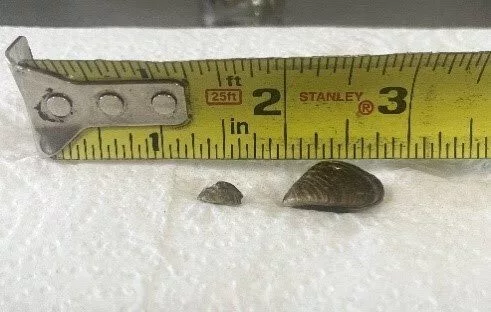
As boat owners and water enthusiasts are getting ready to hit Missouri lakes and rivers, the Missouri Department of Conservation (MDC) warns boat owners to be on the lookout for the infamous invasive zebra mussel.
Zebra mussels are an invasive species that came to North American waters in international shipping ballast water and were first discovered in Lake St. Clair near Detroit in 1988. Zebra mussels were first reported in Missouri in 1991 in the Mississippi River near St. Louis. They have spread to the Missouri, Osage, and Meramec rivers, and streams downstream of infested lakes. They have also been found in the following Missouri lakes: Blue Springs Lake, Bull Shoals Lake, Carrollton Recreation Lake, Lake Jacomo, Lake Lotawana, Lake Taneycomo, Lake of the Ozarks, Longview Lake, Prairie Lee Lake, and Smithville Lake. Just because a river or lake does not have a known infestation of zebra mussels does not mean that they are immune, and the public is encouraged to watch for the invasive mussels.
Invasive zebra mussels hurt native fish numbers and disrupt aquatic ecosystems. They decimate populations of native freshwater mussels and other aquatic animals. Zebra mussels can clog power plants, as well as industrial and public drinking water intakes, foul boat hulls, and motors. One of the greatest risks for spreading the invasive mussels to other lakes and rivers is overland transport on boats, motors, trailers, docks, aquatic plants, pumps and other equipment. Larger adult zebra mussels can live several days out of water in moist, shaded areas. Microscopic zebra mussel larva can survive in boat bilge water, livewells, bait buckets, and engine cooling-water systems.
MDC urges boaters to keep their crafts and equipment free from hitchhiking zebra mussels — especially when moving between waterbodies — by completing the following steps:
- CLEAN — Remove all plants, animals, and mud and thoroughly wash all equipment, especially in crevices and other hidden areas. If the boat or equipment was used in infested waters or if it has attached adult mussels, use a HOT (104-degree Fahrenheit) water spray.
- DRAIN — Eliminate all water before leaving the area, including livewells and transom wells.
- DRY — Allow enough time for the boat to completely dry before launching in other waters.
- DISPOSE — DO NOT dump unused bait into lakes, ponds, rivers, or streams. Put unused bait in a trash can.
Learn more about zebra mussels at https://mdc.mo.gov/fishing/
MDC asks boaters and others to report zebra mussel findings to their nearest MDC regional office, including from known infested lakes and rivers.










